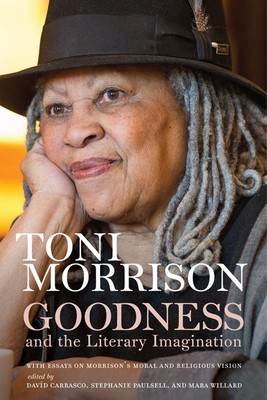
- Išsiųsime per 10–14 d.d.
- Autorius: Toni Morrison
- Leidėjas: University of Virginia Press
- ISBN-10: 0813943620
- ISBN-13: 9780813943626
- Formatas: 14 x 29.5 x 2.1 cm, kieti viršeliai
- Kalba: Anglų
- Extra -15 % nuolaida šiai knygai su kodu: ENG15
Atsiliepimai
Aprašymas
What exactly is goodness? Where is it found in the literary imagination? Toni Morrison, one of American letters' greatest voices, pondered these perplexing questions in her celebrated Ingersoll Lecture, delivered at Harvard University in 2012 and published now for the first time in book form.
Perhaps because it is overshadowed by the more easily defined evil, goodness often escapes our attention. Recalling many literary examples, from Ahab to Coetzee's Michael K, Morrison seeks the essence of goodness and ponders its significant place in her writing. She considers the concept in relation to unforgettable characters from her own works of fiction and arrives at conclusions that are both eloquent and edifying. In a lively interview conducted for this book, Morrison further elaborates on her lecture's ideas, discussing goodness not only in literature but in society and history--particularly black history, which has responded to centuries of brutality with profound creativity.
Morrison's essay is followed by a series of responses by scholars in the fields of religion, ethics, history, and literature to her thoughts on goodness and evil, mercy and love, racism and self-destruction, language and liberation, together with close examination of literary and theoretical expressions from her works. Each of these contributions, written by a scholar of religion, considers the legacy of slavery and how it continues to shape our memories, our complicities, our outcries, our lives, our communities, our literature, and our faith. In addition, the contributors engage the religious orientation in Morrison's novels so that readers who encounter her many memorable characters such as Sula, Beloved, or Frank Money will learn and appreciate how Morrison's notions of goodness and mercy also reflect her understanding of the sacred and the human spirit.
EXTRA 15 % nuolaida su kodu: ENG15
Akcija baigiasi už 4d.00:19:19
Nuolaidos kodas galioja perkant nuo 10 €. Nuolaidos nesumuojamos.

- Autorius: Toni Morrison
- Leidėjas: University of Virginia Press
- ISBN-10: 0813943620
- ISBN-13: 9780813943626
- Formatas: 14 x 29.5 x 2.1 cm, kieti viršeliai
- Kalba: Anglų Anglų
What exactly is goodness? Where is it found in the literary imagination? Toni Morrison, one of American letters' greatest voices, pondered these perplexing questions in her celebrated Ingersoll Lecture, delivered at Harvard University in 2012 and published now for the first time in book form.
Perhaps because it is overshadowed by the more easily defined evil, goodness often escapes our attention. Recalling many literary examples, from Ahab to Coetzee's Michael K, Morrison seeks the essence of goodness and ponders its significant place in her writing. She considers the concept in relation to unforgettable characters from her own works of fiction and arrives at conclusions that are both eloquent and edifying. In a lively interview conducted for this book, Morrison further elaborates on her lecture's ideas, discussing goodness not only in literature but in society and history--particularly black history, which has responded to centuries of brutality with profound creativity.
Morrison's essay is followed by a series of responses by scholars in the fields of religion, ethics, history, and literature to her thoughts on goodness and evil, mercy and love, racism and self-destruction, language and liberation, together with close examination of literary and theoretical expressions from her works. Each of these contributions, written by a scholar of religion, considers the legacy of slavery and how it continues to shape our memories, our complicities, our outcries, our lives, our communities, our literature, and our faith. In addition, the contributors engage the religious orientation in Morrison's novels so that readers who encounter her many memorable characters such as Sula, Beloved, or Frank Money will learn and appreciate how Morrison's notions of goodness and mercy also reflect her understanding of the sacred and the human spirit.




Atsiliepimai